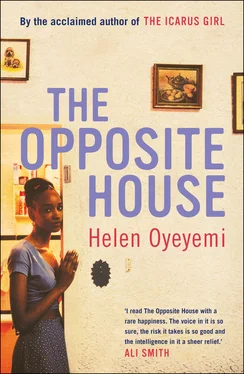Helen Oyeyemi - The Opposite House
Здесь есть возможность читать онлайн «Helen Oyeyemi - The Opposite House» весь текст электронной книги совершенно бесплатно (целиком полную версию без сокращений). В некоторых случаях можно слушать аудио, скачать через торрент в формате fb2 и присутствует краткое содержание. Год выпуска: 2008, Издательство: Bloomsbury UK, Жанр: Современная проза, на английском языке. Описание произведения, (предисловие) а так же отзывы посетителей доступны на портале библиотеки ЛибКат.
- Название:The Opposite House
- Автор:
- Издательство:Bloomsbury UK
- Жанр:
- Год:2008
- ISBN:нет данных
- Рейтинг книги:4 / 5. Голосов: 1
-
Избранное:Добавить в избранное
- Отзывы:
-
Ваша оценка:
- 80
- 1
- 2
- 3
- 4
- 5
The Opposite House: краткое содержание, описание и аннотация
Предлагаем к чтению аннотацию, описание, краткое содержание или предисловие (зависит от того, что написал сам автор книги «The Opposite House»). Если вы не нашли необходимую информацию о книге — напишите в комментариях, мы постараемся отыскать её.
The Opposite House — читать онлайн бесплатно полную книгу (весь текст) целиком
Ниже представлен текст книги, разбитый по страницам. Система сохранения места последней прочитанной страницы, позволяет с удобством читать онлайн бесплатно книгу «The Opposite House», без необходимости каждый раз заново искать на чём Вы остановились. Поставьте закладку, и сможете в любой момент перейти на страницу, на которой закончили чтение.
Интервал:
Закладка:
I recognised the sugar wall, its jigsawed threat. I know that in this world something really is trying to stop me from having a large milkshake with my large fries. This suspicion emerges like a spasm in my jaw whenever what’s crammed in there tastes too well. I used to think that the only reason Chabella could weep copiously and at the same time eat slabs of steak in stewed tomato sauce was that she was not complex. Cubans are cheerful, Cubans are resilient, Cubans are collectivist. In my mother’s country, I thought, la lucha is such that people are not equipped to understand when they are unhappy. It’s a situation-specific kindness from God — Cubans are born lacking; they have no internal ‘off’ switch, and so it is that they go on and on and on.
But look at the British! Their government had to have some of the suffragists force-fed through tubes because each one of them had located her ‘off’ switch and leant her entire weight against it. These women were pissed off. And not a word about it being hard to eat; they did not see the joke in being weak. They did not want to take their place in el drama , or the tender masquerade of scented handkerchiefs and faintness and tears.
When the hysteric saw what the suffragists had done — the way that, en masse, they’d turned starvation onto its side — she must have been surprised. Her shock must have brought her close to speech. Here, in grey climates, are people mocking the things that happen in places that the sun loves more, those places where hunger herds people ahead of her and into blindness, where hunger makes a person run their tongue along their bottom lip to claim the wilted wings shed by dead flies. Suddenly so clear, or clearer, that people will use all of their frailty to hold out for more, that people go into sickness as a signal test.
Two months ago a woman drove her car off the end of a pier in Blackpool and drowned. But first, cloaked in deepening water, she smoked two cigarettes whilst waiting for the people milling around on the mainland to realise that they weren’t going to be able to get help to her in time. People tried to get the woman’s attention; they tried to reassure her. She refused to look their way. She was from Cameroon, which is why at first there was some confusion over whether she had accidentally driven off the pier or whether this was a suicide attempt.
People who actually knew this ‘pier woman’ might not have described her as sensitive. They would probably have said she was ‘tough’ or ‘loud’ or ‘pushy’, all the while thinking: ‘black’. One eyewitness maintained that the entire thing was an accident. With her thumb Amy Eleni jabbed the offending lines in the Fortean Times: ‘Yeah right, eyewitness! If it was an accident why wasn’t she making eye contact or looking for help? Why wasn’t she asking for reassurance that she wasn’t going to die?’
The pier woman was in the kind of trouble that calls for a material defence. Two unhurried cigarettes, a reminder to her body that breath can be made visible. Trouble: a thing heard on the air and in my headphones when my favourite song plays. It climbs inside and puppeteers until I echo. Maybe the hysteric is my mystic signal test, a way of checking, asking:
Who’s there?
Something old? Someone holy. .?
Amy Eleni longed for a knife to slit away the webbing between her stiff fingers. I chased my vein lines with glass. Maybe we were having conversations so intense we couldn’t hear them. If we could have heard what we were saying, Amy Eleni and I, we’d have cringed the way we do when we think of someone using prayer to bargain, cramming extra requests in on the back of the usual one-request-per-rosary-bead transaction. But the hysteric, she makes us able to say without knowing. She makes us able to say to this trouble that comes: Wait! Please don’t go. Just in case you’re holy after all. Really I’m like you. I can be strange and deep-flowing too. See?
Despina frightens me with her cold eyes and her measured voice and the long, lost time she spends standing before the bright Orthodox icons in the hallway when she gets back from work. I don’t know what I’d do if Despina was my mother. She is the tallest silence. Despina is no Jacob. Neither is she Bisabuela Carmen that she would lay hands on her god and try to break him and make him stay. It’s the reason why she’s still alive; religious people know their place. I wonder does Chabella fit that pattern.
9 clandestine spiritual warfare
One of the first things that really felt like a London episode happened when Papi was away at a conference. I was ten. Papi called at 3 a.m. and Mami spoke to him in a cute, bright chirrup and woke me up to speak to him too. She pinched me to stop me from begging him to come home.
Chabella’s English was still really bad then; it embarrassed me. The teachers at school always asked to speak to Papi instead of her. I couldn’t understand why she was able to understand English but couldn’t speak it the way that she spoke German. It was too embarrassing, standing in between Mami and someone else, translating words Mami threw at them in Spanish when they had questioned her in English.
After Papi’s phone call, Mami made her paper flowers and cried over them for a long time — she wet her flowers so that they wouldn’t catch fire, she cried until she couldn’t talk. I hugged her and kissed her. I hugged her and kissed her religiously, like a ritual; I kissed and hugged her medically, like a life-saving technique. The flowers drowned anyway.
Chabella was still, and I was still. Outside someone, a woman, was crying; she was asking for help, gave a muffled scream, gulped back louder tears, cried Rape . I looked to Mami, and Mami put a finger over her lips and went to the sitting-room window; we looked out carefully, carefully from under the hem of the net curtain.
Neat and narrow; the street had broken itself off into a chunk of shadowed road and bin and diamond-shaped lamplight — it looked painted on the air. Watching the road and the man and the woman in the road, I knew we’d never be able to touch what we saw, even if we went down and stood there.
The woman was white. She cried Please , and a white man yanked at her ponytail so that she teetered on her spiky heels. It wasn’t playful tugging, but the man was straining to look amused, to look as if he were at play. He locked an arm around her throat and walked away; she came with him in degrees. He was so casual that it didn’t look as if he intended to drag her away, but just to walk with her held against him like a suit he was trying on for size. If it hadn’t been for the involuntary sounds she made. Her lungs convulsed and spoke loudly for her, over and over, puh puh puh puh .
Around the corner a group of people laughed in a hard, ragged burst, but it took a second to realise that there were other people out on the road; the laughter was somehow like traffic, a noise that was not really sound, but city liquefied. Mami and I shrank up against each other, shrank into each other. Beneath the curtains there was a shadow-strained forever that fell from ceiling to floor and roped us round in its folds.
Mami whispered, ‘Puedo no,’ — I can’t — before I even told her that she had to call the police.
‘Mami, you’re not going to call the police?’ I asked loudly.
The man and the woman were gone. Nothing and no one moved on the street. I knew that you didn’t call the police for just anything. I was not sure what rape was then, but if it made a woman cry out like she was dying, and made me feel, me too , anything like that was serious enough for the police.
‘Mi inglés, mi inglés es tan malo, ellos no me entenderán,’ Mami said, and there were so many tears from her that I couldn’t dry them with my hands. She wanted me to understand why she wasn’t going to help, but I couldn’t understand.
Читать дальшеИнтервал:
Закладка:
Похожие книги на «The Opposite House»
Представляем Вашему вниманию похожие книги на «The Opposite House» списком для выбора. Мы отобрали схожую по названию и смыслу литературу в надежде предоставить читателям больше вариантов отыскать новые, интересные, ещё непрочитанные произведения.
Обсуждение, отзывы о книге «The Opposite House» и просто собственные мнения читателей. Оставьте ваши комментарии, напишите, что Вы думаете о произведении, его смысле или главных героях. Укажите что конкретно понравилось, а что нет, и почему Вы так считаете.












